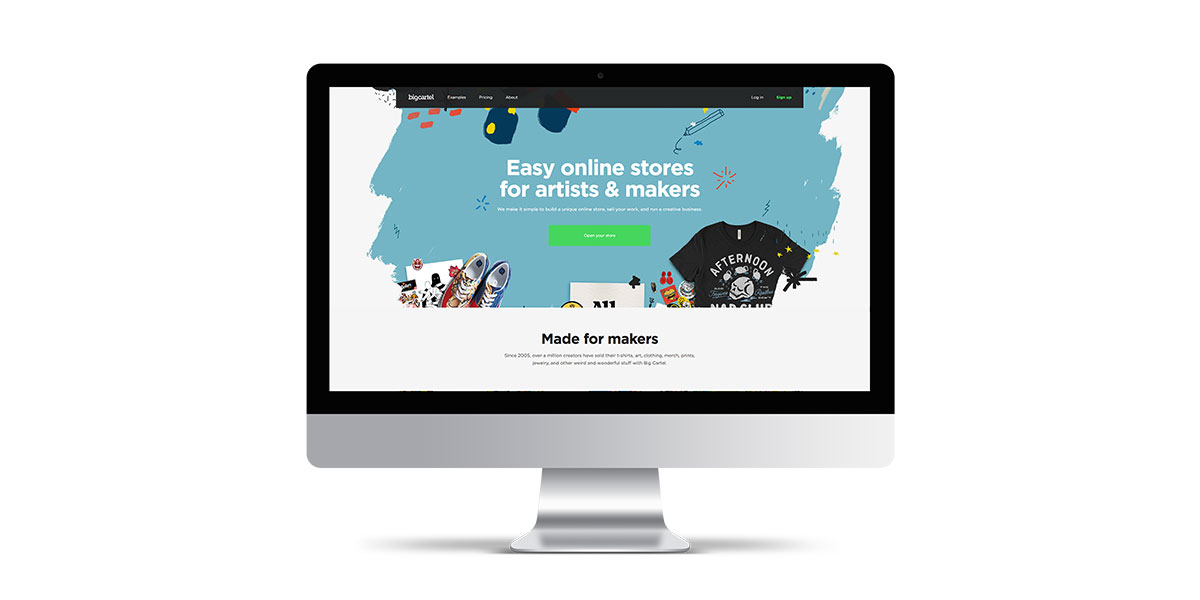If you run an online store, you need some sort of system to actually showcase your products/services and handle online payments. That system is called an eCommerce platform and includes everything from simple drag-and-drop website editors like Wix to enterprise-level eCommerce juggernauts like Magento.
With so many platforms on the market, it can be difficult to know which one is right for your business.
That's why I've collected the most popular eCommerce platforms and put them to the test in this definitive comparison.
I'll start with an in-depth review of each platform then summarise the results in a comparison table at the end. As always, if you think I've missed anything or you disagree with my opinion, leave a comment and I'll get back to you as soon as I can.
Article Contents
What is an eCommerce platform?
An eCommerce platform is the software behind an online business. It handles stuff like the website, shopping cart, stock management and order processing. All eCommerce platforms can be divided into one of two camps: Hosted and self-hosted.
Self-hosted eCommerce platforms are managed and maintained by the merchant. If you aren’t technically proficient, self-hosted platforms can be a bit daunting as they require a fair bit of technical work to get up and running. Hosted platforms are hosted and maintained by a third-party. Merchants usually pay a subscription fee to the third-party to use the system. Hosted platforms are usually more user-friendly and are geared towards less technical users.
In the next few sections, we'll take a look at 10 of the most popular eCommerce platforms on the market, discussing what they do well, how they could improve and what sort of merchants they are best suited for. Let's get started!

Wix
Wix markets itself as a super user-friendly website builder. Just drag and drop the elements until everything looks right and Wix will handle the rest. Thanks to its completely free tier and great backend system, Wix has grown to become the most popular hosted solution in the UK.
(A hosted solution is one where the provider hosts the website and you pay a subscription to use it.)
Features
With Wix, you get a bunch of pre-built eCommerce templates and every element is customisable. Just select a template and start tweaking. The site builder, in general, works incredibly well and strikes a nice balance between functionality and ease of use.
To accept online payments, Wix requires an external payment gateway. How much you’re charged to process payments will depend solely on the payment gateway you select and the deal you strike with the provider.
Positives
- Completely free tier
- Good range of pre-built templates
- Powerful drag-and-drop editor
- Designed so everyone can use it
Negatives
- Not as technical as other platforms
- Lacks some SEO functionality
- Migration to other platforms is difficult
Final Verdict
At the end of the day, Wix is an entry-level DIY website builder. If that's what you're looking for, it's difficult to ignore Wix entirely.
Wix has fairly mixed reviews across the Internet. However, it's worth noting that most of the poor reviews relate to Wix's customer service rather than the platform itself. Although, you could argue that a platform's customer service is part of the platform. Anyhow, Wix has a free tier so you can play about with the system before committing to a plan. We think that negates a lot of the risk implied by Wix's reviews.

Shopify
Shopify is the most popular hosted eCommerce platform in the UK. It launched in 2004 in Canada and (after a first few quiet years) exploded in popularity around 2011 or 2012. Right now, there are over 43,000 online businesses using Shopify in the UK. It’s not surprising why it has grown so fast either.
Features
There’s a bunch of attractive and effective website themes. The backend interface is super intuitive. The integrated payments are handy if a bit expensive. And Shopify’s offline POS products mean you can effectively integrate your offline and online service.
The main drawback to Shopify is the price. Both the upfront subscription costs and ongoing costs are significantly higher than other platforms, making Shopify a less attractive option for businesses operating at scale or with low profit margins.
Positives
- Fantastic website themes
- Intuitive backend system
- Impressive customer-facing functionality
- Easy integrated payments
Negatives
- One of the more expensive platforms
- Integrated payments are expensive
- Migration to other platforms is difficult
Final Verdict
Shopify is the biggest name in hosted eCommerce platforms, eclipsing its rivals and even challenging free, self-hosted services like WooCommerce and Magento. Shopify is a great platform for merchants, especially when they're just starting out since it's so easy to use. However, it's not the cheapest and its fees become less reasonable the larger your business grows.
In terms of reviews, aside from the obligatory Trustpilot slating, Shopify performs quite well on other sites.
If you're looking to purchase a Shopify card reader, make sure to use our Shopify affiliate link for money off!

BigCommerce
BigCommerce is a big player in the US eCommerce market with over 74,000 sites live right now. While smaller in the UK , BigCommerce is gaining traction and squaring up to more established players like Shopify and Wix.
Features
BigCommerce comes in four tiers — Standard, Plus, Pro and Enterprise — to support varying levels of business. All four options are hosted platforms with each tier adding a bit more functionality.
Like Shopify, BigCommerce comes with an integrated payment system. However, unlike Shopify, it doesn’t charge you payment processing fees. Instead, it absorbs the fee and charges you 0% until you hit an upper threshold. The threshold is $50,000, $150,000 and $400,000 for the Standard, Plus and Pro tiers, respectively. The Enterprise pricing is all negotiated on an account-by-account basis.
Positives
- No transaction fees
- Unlimited products
- Impressive functionality from apps
- Enterprise tier available
Negatives
- Most themes cost extra
- Mixed online reviews
- Unreliable support
- Tiers based on turnover
Final Verdict
If you're a UK merchant, you might not have heard about BigCommerce. But as it gains more of a foothold in the UK, I'm sure we'll hear about more merchants giving it a go. As an eCommerce platform, it's one of the best out there. It's easy enough to use so that novice merchants can start selling with ease and powerful enough to support businesses as they grow.
BigCommerce's have excellent reviews which should tell you everything you need to know about the quality of the platform. So go test it out and let me know what you think in the comments.

Squarespace
If you’ve listened to any podcast in the past few years, you’ve probably heard of Squarespace. Squarespace was founded by Anthony Casalena who developed the platform on his own between 2003 and 2007.
After 2007, Casalena began hiring staff and there are now 797 people working on the platform.
In the grand scheme of things, Squarespace is still quite a small player. That’s not to say it’s a bad platform, though. Squarespace is an excellent website builder and the eCommerce shop builder is an excellent recent addition.
Features
There are two tiers on offer — Basic and Advanced — with the more expensive tier adding in a handful of additional features like intelligent discounts, gift cards and order APIs.
The core functionality is all very good. There’s a bunch of great templates, the customisation options are impressive, its analytics are helpful and it’s all available for a very reasonable subscription price.
The biggest drawback to Squarespace is its payments. At the moment, Squarespace only works with Stripe and PayPal, neither of which are particularly cheap. If you want to find and use your own payment gateway, you’re out of luck.
Positives
- Nice pre-designed templates
- Customisation options are impressive
- Low monthly fees
- No transaction fees
Negatives
- Limited to Stripe and PayPal
- Functionality is limited
Final Verdict
Squarespace is a big name in DIY website builders but it's still finding its feet as an eCommerce platform. (In its defence, building an intuitive eCommerce website builder is incredibly difficult!) Like many website builders, Squarespace gets hammered on Trustpilot but has positive reviews on all other review platforms.
If you've used Squarespace in the past (and like it), you'd be silly not to, at least, consider Squarespace for your next online shop. While it isn't as powerful or as flexible as WooCommerce or Magento, it's great for getting started, especially if you don't have much technical experience.

WooCommerce
WooCommerce is the first self-hosted platform on the list, meaning you’ll have to buy hosting and manage the website yourself. (Or have someone else do it for you.) Also, unlike the other options so far, WooCommerce isn’t a stand-alone product as it requires a WordPress installation to work.
As you might have guessed, WooCommerce is a bit more complicated than a hosted platform and is designed for more complex online businesses.
With over 6,000 WooCommerce websites in the UK, the platform has a big presence in the mid-range market.
Features
While WooCommerce is technically free, you’ll have to pay for your own hosting and (unless you find a free one) a theme. Also while a lot of plugins are free, some of the better ones are paid. Finally, unless you have some technical knowledge, you will require a developer to make structural changes to the site.
Since WooCommerce is based on WordPress, the community is huge and there are tens of thousands of free and paid themes out there. And if you want to tweak or change anything, it’s usually pretty easy to find a freelance developer or development agency.
Positives
- Huge range of templates
- Good access to developers
- It's free and open source
Negatives
- No support from WooCommerce
- More complicated than hosted options
- Usually requires a developer
Final Verdict
WooCommerce is the free eCommerce add-on to the world's most popular content management system: WordPress. It's also the most popular eCommerce platform, powering over 20 percent of online stores.
WooCommerce performs well across most review sites. And the reason is simple: it's an excellent platform.

Zen Cart
Zen Cart is the third most popular open source platform in the UK after WordPress (WooCommerce) and Magento. And while its popularity peaked in 2014, it’s still used by approximately 25,000 sites in the UK and 380,000 websites worldwide.
Features
As an open source piece of software, Zen Cart is free to download and use. However, like WooCommerce, you will need to arrange things like hosting, themes, payment gateways and so on.
While there are themes available, most now look quite dated, especially next to newer themes for WordPress. The backend is also starting to look its age with complicated navigation and structure. If you’re not familiar with complex eCommerce systems, ZenCart can be tough to get your head around.
Positives
- Free to download and use
- Powerful eCommerce functionality
Negatives
- Old fashioned themes
- Complicated backend
Final Verdict
As I mentioned before, Zen Cart is starting to show its age. Its themes are quite dated, the backend is fairly clunky and it just doesn't stack up against slicker competitors. If you're already using Zen Cart, it might be worth sticking with it. But if you're looking for a new eCommerce platform, I think there are better options available.
While Zen Cart does have good reviews, I'm guessing that most are from merchants who have used the platform for quite some time. Since these merchants are bedded into the platform, their reviews aren't overly relevant to merchants looking for a new service.

Big Cartel
Big Cartel is one of a new breed of platforms targeting independent artists and makers. If you’re running a huge eCommerce operation with 5,000 SKUs, this isn’t the right platform for you. However, if you’re a one-man or one-woman band and need a simple, lightweight online shop, look no further.
Features
With Big Cartel, you get access to a bunch of pre-made themes and can customise almost everything.
Positives
- Very easy to use
- Designed for independents and small businesses
- Free plan available
- Quick to set up
Negatives
- Limited to Stripe and PayPal
- Not as many themes as other platforms
- Not designed for scale
Final Verdict
Big Cartel is one of those platforms that definitely isn't for everyone. It won't, for example, work for big retail businesses with 5,000 SKUs. But if you're a small merchant who intends to remain small, it's a great choice.

Magento
Magento is the other big player alongside WooCommerce in the self-hosted space. And whereas WooCommerce is a plugin for WordPress, Magento is a stand-alone all-eCommerce platform.
If you’re operating a large eCommerce business, Magento should be the first platform you consider.
Features
The beauty of Magento is that it's an enterprise-level eCommerce platform that's available to all businesses. It’s capable of supporting huge 50,000-SKU operations without breaking a sweat, which is something you can't say for most of the other platforms on this list.
Magento's complexity does, admittedly, make it a little tricky to set up and use so I don’t recommend it for businesses unless they really need the power.
Magento requires an external payment gateway so your payment processing fees will depend on what payment gateway you go for and the deal you strike with the provider.
(There's also offers a hosted version of the site called Magento Commerce. This gives you all the functionality of Magento without the hassle of hosting. However, it is fairly expensive and not a great choice for the majority of businesses.)
Positives
- Enterprise-level functionality
- Free and open source
- Good industry support
- Lots of pre-made templates
Negatives
- Complicated to set up and use
- Hosted version is very expensive
- Extra fees like hosting and payment gateways
Final Verdict
Magento is the name in self-hosted eCommerce software for complicated shops. Yes, it's complicated but it can do so much more than almost all of its competitors.
Magento scores fairly well across the board, never dipping below four-out-of-five.

PrestaShop
PrestaShop is a self-hosted eCommerce platform that competes at the level of WooCommerce. However, unlike WooCommerce it’s a stand-alone product and is designed from the ground up as an eCommerce platform. (Technically PrestaShop does have a hosted version called PrestaShop Ready but we're going to ignore that for simplicity.)
Features
Like WooCommerce and Magento, you download the open source software and upload it to your own hosting. You’ll also need to arrange your own payment gateway to accept payments.
Since it’s used by far fewer businesses (just 8,500 in the UK and 340,000 worldwide), third-party support is patchy. Yes, there are themes and developers out there but it’s nowhere near as common as WooCommerce.
Positives
- Easy to use
- Free and open source
- Some good themes and plugins
Negatives
- Mixed reviews
- Not as much third-party support as WooCommerce
Final Verdict
The self-hosted version of PrestaShop is a complicated beast. If you know what you're doing, you can create an awesome eCommerce website. However, that requires some reasonably in-depth knowledge of HTML, CSS and PHP—or a fat enough wallet to hire someone with those skills. As a result, there are some mixed reviews online.
A quick review of Trustpilot shows that the majority of PrestaShop's worst reviews are from merchants who wanted a plug-and-play solution or who needed a tonne of hand holding. If you're confident in your technical skills, there's no reason why you shouldn't give PrestaShop a go.

Etsy
Etsy is a little different to other platforms on this list. While other platforms allow you to make your own discrete site, Etsy’s shops are all grouped together in a huge global marketplace. Think eBay or Amazon marketplace.
Features
As far as shop customizability goes, Etsy isn’t the best. You really list your products and Etsy displays them in its own structure.
But that’s not really the point in Etsy. The point is that you add your products to their marketplace and get access to tens of millions of buyers. Other platforms simply can’t compete with that.
Positives
- Access to a huge marketplace
- Attractive shop design
Negatives
- Listing fees eat into profits
- High payment processing fees
- HIgh transaction fees
- Tight restrictions on sellers
Final Verdict
It's a little tricky to summarise Etsy's reviews as it's both a selling platform for merchants and a buying platform for customers. Many of Etsy's worst reviews, particularly on Trustpilot, relate to merchants on Etsy and not the platform itself.












